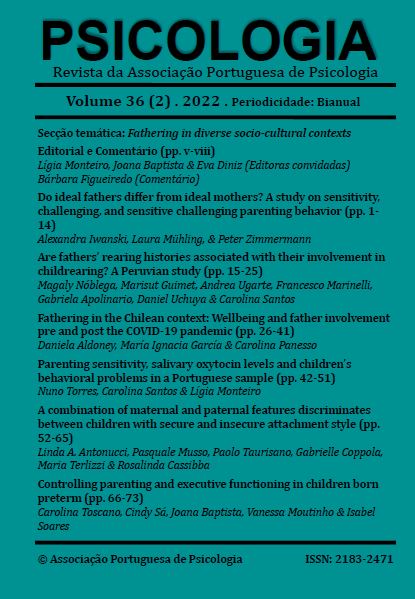Controlling parenting and executive functioning in children born preterm
DOI:
https://doi.org/10.17575/psicologia.1754Palavras-chave:
Executive functioning, Controlling parenting, Father, PrematurityResumo
This study investigated the relations between mothers’ and fathers’ controlling behaviors and the executive functioning of children born preterm. Sixty-eight preterm children and their parents were assessed when the children were 3 ½ years old. The executive functioning was measured using the Head-to-Toes-Task and controlling parenting behaviors were measured through a standardized observation of a parent-child interaction. Hierarchical regression analysis showed that both mothers’ and fathers’ controlling behaviors were associated with worse child executive functioning performance, after controlling for the child’s cognitive ability. Findings suggest that both mothers and fathers play an important role in the development of executive functioning of children born prematurely, highlighting the need to consider both parents in the study of and intervention with these children.
Downloads
Referências
Aarnoudse-Moens, C. S. H., Weisglas-Kuperus, N., van Goudoever, J. B., & Oosterlaan, J. (2009). Meta-analysis of neurobehavioural outcomes in very preterm and/or very low birth weight children. Pediatrics 124(2), 717–728. https://doi.org/10.1542/peds.2008-2816
Anderson, V. (2001). Assessing executive functions in children: Biological, psychological, and developmental considerations. Pediatric Rehabilitation, 4(3), 119-136. https://doi.org/10.1080/13638490110091347
Arpi, E., D'Amico, R., Lucaccioni, L., Bedetti, L., Berardi, A., & Ferrari, F. (2019). Worse global intellectual and worse neuropsychological functioning in preterm-born children at preschool age: A meta-analysis. Acta Paediatrica, 108(9), 1567-1579. https://doi.org/10.1111/apa.14836
Baptista, J., Sousa, D., Soares, I., & Martins, C. (2018). Fathers’ sensitive guidance moderates the association between coparenting and behavioral regulation in preschoolers. International Journal of Behavioral Development, 42(6), 574-580. https://doi.org/10.1177/0165025418761816
Barkmann, C., Helle, N., & Bindt, C. (2018). Is very low infant birth weight a predictor for a five-year course of depression in parents? A latent growth curve model. Journal of Affective Disorders, 229(5), 415-420. https://doi.org/10.1016/j.jad.2017.12.020
Bayless, S., & Stevenson, J. (2007). Executive functions in school-age children born very prematurely. Early Human Development, 83(4), 247-254. https://doi.org/10.1016/j.earlhumdev.2006.05.021
Bögels, S. M., & Phares, V. (2008). Fathers’ role in the etiology, prevention and treatment of child anxiety: A review and new model. Clinical Psychology Review, 28(4), 539–558. https://doi.org/10.1016/j.cpr.2007.07.011
Brydges, C. R., Landes, J. K., Reid, C. L., Campbell, C., French, N., & Anderson, M. (2018). Cognitive outcomes in children and adolescents born very preterm: A meta-analysis. Developmental Medicine & Child Neurology, 60(5), 452-468. https://doi.org/10.1111/dmcn.13685
Carlson, S. M., Zelazo, P. D., & Faja, S. (2013). Executive function. In P. D. Zelazo (Ed.), Oxford library of psychology. The Oxford handbook of developmental psychology (Vol. 1): Body and mind (p. 706–743). Oxford University Press.
Chyi, L. J., Lee, H. C., Hintz, S. R., Gould, J. B., & Sutcliffe, T. L. (2008). School outcomes of late preterm infants: Special needs and challenges for infants born at 32 to 36 weeks gestation. The Journal of Pediatrics, 153(1), 25-31. https://doi.org/10.1016/j.jpeds.2008.01.027
Clark, C. A. C., & Woodward, L. J. (2015). Relation of perinatal risk and early parenting to executive control at the transition to school. Developmental Science, 18(4), 525-542. https://doi.org/10.1111/desc.12232
Euro-Peristat Project. (2018). European perinatal health report. https://www.europeristat.com/index.php/reports/european-perinatal-health-report-2015.html
Fay-Stammbach, T., Hawes, D. J., & Meredith, P. (2014). Parenting influences on executive function in early childhood: A review. Child Development Perspectives, 8(4), 258-264. https://doi.org/10.1111/cdep.12095
Feldman, R. (2007). Maternal versus child risk and the development of parent – child and family relationships in five high-risk populations. Development and Psychopathology, 19, 293–312. https://doi.org/10.1017/S0954579407070150
Gardner, F. (2000). Methodological issues in the direct observation of parent–child interaction: Do observational findings reflect the natural behavior of participants? Clinical Child and Family Psychology Review, 2(3), 185-198. https://doi.org/10.1023/a:1009503409699
Goldberg, S., & DiVitto, B. (2002). Parenting children born preterm. In M. H. Bornstein (Ed.), Handbook of Parenting (pp. 329-354). Erlbaum.
Griffin, J. A., Freund, L. S., McCardle, P., DelCarmen-Wiggins, R., & Haydon, A. (2016). Introduction to executive function in preschool-age children. In J. A. Griffin, P. McCardle, & L. S. Freund (Eds.), Executive Function in Preschool-age Children: Integrating Measurement, Neurodevelopment, and Translational Research (pp. 3–7). American Psychological Association.
Johnson, S. Z., & Holmbeck, G. N. (1995). Manual for OP coding system [Unpublished manuscript]. Loyola University of Chicago.
Karreman, A., Van Tuijl, C., van Aken, M. A., & Deković, M. (2006). Parenting and self-regulation in preschoolers: A meta-analysis. Infant and Child Development: An International Journal of Research and Practice, 15(6), 561-579. https://doi.org/10.1002/icd.478
Matte-Gagné, C., & Bernier, A. (2011). Prospective relations between maternal autonomy support and child executive functioning: Investigating the mediating role of child language ability. Journal of Experimental Child Psychology, 110(4), 611-625. https://doi.org/10.1016/j.jecp.2011.06.006
Meuwissen, A. S., & Carlson, S. M. (2015). Fathers matter: The role of father parenting in preschoolers’ executive function development. Journal of Experimental Child Psychology, 140, 1-15. https://doi.org/10.1016/j.jecp.2015.06.010
Ponitz, C. E. C., McClelland, M. M., Jewkes, A. M., Connor, C. M., Farris, C. L., & Morrison, F. J. (2008). Touch your toes! Developing a direct measure of behavioral regulation in early childhood. Early Childhood Research Quarterly, 23, 141-158. https://doi.org/10.1016/j.ecresq.2007.01.004
Sattler, J. M. (1992). Assessment of children: Revised and updated third edition. Jerome M. Sattler Publisher, Inc.
Talge, N. M., Holzman, C., Wang, J., Lucia, V., Gardiner, J., & Breslau, N. (2010). Late-preterm birth and its association with cognitive and socioemotional outcomes at 6 years of age. Pediatrics, 126(6), 1124-1131. https://doi.org/10.1542/peds.2010-1536
Toscano, C., Soares, I., & Mesman, J. (2020). Controlling parenting behaviors in parents of children born preterm: A meta-analysis. Journal of Developmental and Behavioral Pediatrics, 41(3), 230-241. https://doi.org/10.1097/DBP.0000000000000762
Turminello, E. R., Holmbeck, G. N., & Olson, R. (2012). Executive functions in adolescents with spina bifida: Relations with autonomy development and parental intrusiveness. Child Neuropsychology, 18(2), 105-124. https://doi.org/10.1080/09297049.2011.590470
Valcan, D. S., Davis, H., & Pino-Pasternak, D. (2017). Parental behaviours predicting early childhood executive functions: A meta-analysis. Educational Psychology Review, 30, 607–649. https://doi.org/10.1007/s10648-017-9411-9
Wechsler, D. (2003). Escala de inteligência de Wechsler para a idade pré-escolar e primária: Edição revista. CEGOC.
World Health Organization (2018). Preterm birth. https://www.who.int/news-room/fact-sheets/detail/preterm-birth
Zukerman, J. M., Devine, K. A., & Holmbeck, G. N. (2010). Adolescent predictors of emerging adulthood milestones in youth with spina bifida. Journal of Pediatric Psychology, 36(3), 1-12. https://doi.org/10.1093/jpepsy/jsq075


